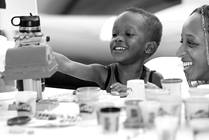Search Results
Viewing: 7631-7640 of 11765 | All

Improving Children’s Health by Improving the Community
One of Nationwide Children’s Hospital signature initiatives to improve outcomes for an entire population – Healthy Neighborhoods Healthy Families – was the recipient of the 2020 Hearst Health Prize.

Improving Communities and Community Wellness
Vice President of Community Wellness Nick Jones sits down to discuss his philosophy on community improvement, Healthy Homes Healthy Families initiatives and priorities for 2023.

Investing in the Community? Listen to the Community First.
Nationwide Children’s Hospital’s national model of community investment is built on a trusting relationship with residents. Nick Jones, director of Healthy Neighborhoods Health Families, writes for the American Hospital Association about how that trust was built.
News
Nationwide Children’s Hospital Tops Forbes List of ‘America’s Best Employers for Women’
Nationwide Children’s Hospital has ranked first on Forbes’ 2024 “America’s Best Employers for Women” list.

News
Nationwide Children’s Hospital Included on Forbes’ List of ‘America’s Best Employers for Women’
Nationwide Children’s Hospital has ranked in the top 10 and as the top employer in Ohio on Forbes’ 2025 “America’s Best Employers for Women” list.
News
Nationwide Children’s Hospital Recognized Among Best of the Best
Nationwide Children’s Hospital has been named to U.S. News & World Report’s Best Children’s Hospitals Honor Roll for the 11th consecutive year. The Honor Roll is a top distinction awarded to only 10 children’s hospitals nationwide.

“PlayStreets” Gets More Children Outside for Neighborhood Fun
Nationwide Children’s PlayStreets initiatives drew thousands during the summer of 2023 with outdoor events promoting play and community interaction.
Addressing Health Equity
Many children face health disadvantages that can be addressed with a focus on health equity. Find out how we can better, and more equitably, help those children have the best possible health outcomes.

The Collaboratory
The Collaboratory for Kids and Community Health is a hub for innovative ideas improving the health of children and their neighborhoods.
